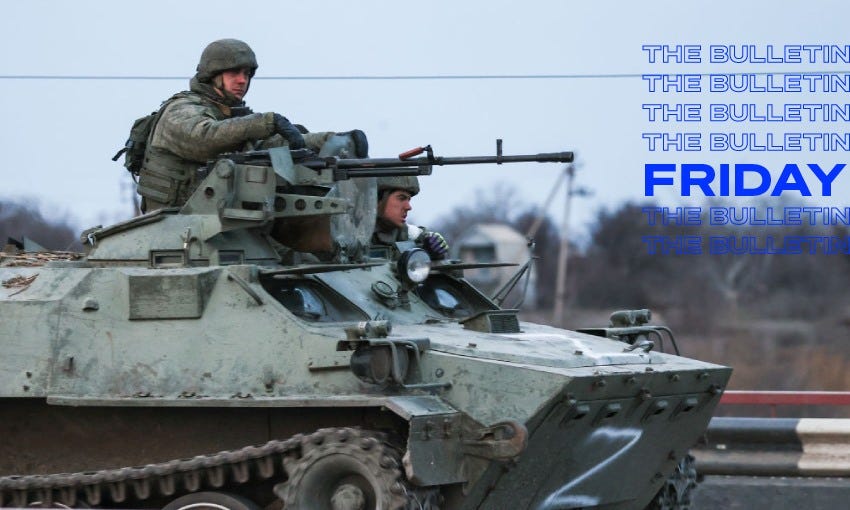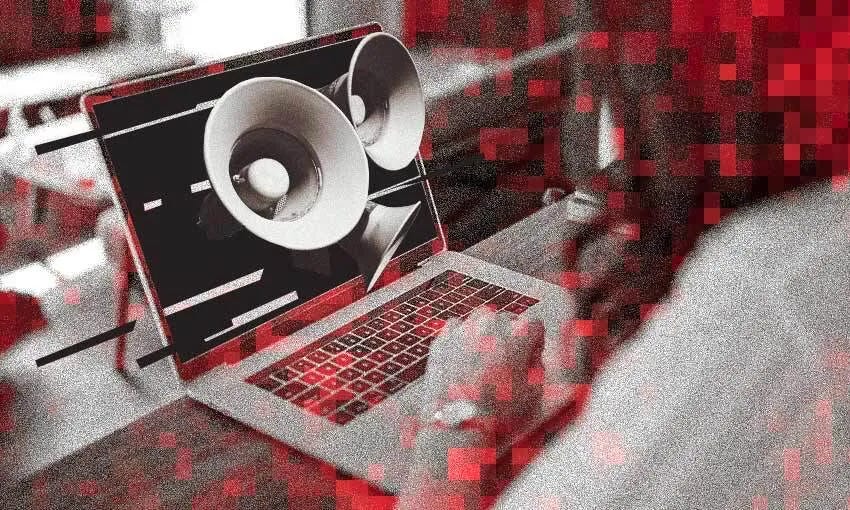Mōrena and welcome to The Bulletin for Friday, February 25, by Justin Giovannetti. Presented in partnership with Z Energy.
In today’s edition: Phase three of the omicron approach; an uncertain future in Tonga; strict new rules for carbon farming; but first, Russia’s invasion of Ukraine.
A Russian military column moves across the town of Armyansk, northern Crimea. (Image: Sergei Malgavko\TASS via Getty Images)
The Russian military has unleashed a full-scale invasion of Ukraine. What Vladimir Putin termed a “special military operation” was an invasion, as cruise missiles started exploding in Kyiv and Ukraine’s largest cities just before dawn yesterday. The Guardian has written about the first salvos in an unwelcome war. It’s a sad testament to the state of affairs in the 21st century that a democracy, however imperfect in Ukraine, is being invaded by an authoritarian, nuclear-armed Russia. Only a generation after the end of the Cold War and the fall of the iron curtain, Russia is once again looking to subjugate parts of eastern Europe. Across a stunned continent, leaders have warned that Europe faces its darkest hour since the Second World War.
Let’s go back to the basics. The Washington Post has a quick explainer on the conflict. One of the points raised is a central part of Putin’s propaganda, that the invasion is meant to “denazify” the Ukrainian government. Ukraine’s president is jewish and was a comedian. He isn’t a Nazi. Want more details? Peter Bale has written a not-so-short introduction to the conflict.
The world is responding with sanctions and emergency meetings. Announcing the invasion of his neighbour, Putin told the Russian people they weren’t safe from the threats emanating from a democratic Ukraine. He said the Russian military would not occupy Ukrainian territory or “impose anything by force”. Moments later, his military attacked the country and began occupying its territory. There are reports of fighting throughout Ukraine, even outside Chernobyl. According to Reuters, an emergency meeting of the UN security council was called yesterday where Russia called on Ukraine to surrender. The US has ruled out sending troops to Ukraine, but most of the world is united in preparing a package of economic sanctions to punish the invasion.
Will sanctions be enough? Only hours before the invasion, foreign affairs experts were musing about whether harsh economic sanctions from the west could be enough to deter Russian aggression. Sanctions didn’t work eight years earlier when Russia annexed Ukraine’s Crimean peninsula. The Russian economy was pummelled for two years, with the value of the ruble falling sharply and the price of many goods soaring in the country. But in retrospect, the verdict appears to be that those sanctions may have been too timid. It was hoped that the promise of a global economic boycott could change things this time. It appears those hopes were misplaced. With massive sanctions coming against a modern economy, the Atlantic writes that nothing has been attempted like this before.
This war will now have a heavy price for Ukraine, for Russia and for the world. In the wake of painful economic sanctions from the west, Moscow is likely to retaliate with painful cyber warfare. Russia is also one of the world’s largest oil producers. After oil soared overnight, petrol prices are likely to increase sharply in the coming days and weeks. As Stuff reports, New Zealand has condemned the attack and told Russia that it’s prepared to work with its partners on diplomatic and economic bans. “We stand with the people of Ukraine,” said foreign minister Nanaia Mahuta.
What does this mean for New Zealand? I spoke to Robert Patman, international relations professor at the University of Otago, about what’s coming next. Like many reporters in Kyiv and leaders across the world, he still seemed in disbelief. He used the word “appalling” a number of times in the first few minutes of our conversation. With eastern European countries on edge, supporting Ukraine with military equipment and unwilling to see it fall to the Russian army, there’s a possibility the situation could spiral out of control, he warned. Here’s Patman on what New Zealand needs to do:
“I don’t think New Zealand can sit this one out. We’ve always prided ourselves on standing up for decency and an independent foreign policy. Small countries like New Zealand need a global system based on rules. Those rules were just trashed. We need to avoid the drift to might is right. Let’s be quite clear. Small and middle powers are important in international politics. We wouldn’t accept a master-servant relationship with China and that’s what Russia is seeking in Ukraine. That’s unacceptable.”
With omicron cases increasing and an ongoing protest fuelled by the spread of misinformation, fact-based and level-headed journalism is more important than ever.
The generous support of our members powers all of The Spinoff's journalism, including live updates on the ground at the Wellington protest, the award-winning collaborations between Toby Morris and Siouxsie Wiles, and richly reported feature writing. It's what you need to know, without the sensationalism – and member donations keep it free to all, without a paywall. Tautoko mai, join The Spinoff Members today.
The country has entered phase three of the omicron response. “A much greater degree of personal responsibility,” that’s how Covid-19 minister Chris Hipkins explained the new rules yesterday. You need to do your own contact tracing, your own testing and make up your own mind about isolating. Stuff was at a revealing press conference that I’ll revisit in a future Bulletin. But first, many of the new rules will require a significant adjustment after two years of restrictions. As an example, the concepts of close and casual contacts have now been scrapped. You only need to isolate and get tested if you live with a confirmed case. Rapid tests should be available in stores next month, but they won’t be free for surveillance testing like in many other countries. The Spinoff has an explainer on phase three.
The Spinoff’s Covid data tracker has the latest figures.
An uncertain future for Tongan islanders. The Associated Press’ Nick Perry spoke with survivors of last month’s volcano who lived on Mango island, one of the closest parts of Tonga to the volcano. They describe how every home was destroyed by the tsunami that followed and how many just want to return to the lives they had. Some want to start new lives in the capital, Nuku’alofa. Perry has written one of the most detailed, and most difficult, accounts of what life was like in the hours and days after the eruption.
Stricter approvals coming for foreign investors eyeing carbon farming. The government has announced that the process of purchasing farmland for conversion into forestry will now face a harder test for overseas investors. As Farmer’s Weekly reports, there’s been cautious optimism about the change after a number of high-profile conversions of land over the past year. The practice isn’t popular in rural areas, with fears of lost long-term jobs and productive land.
Three accused of electoral fraud for Labour donations face similar charges with National. Name suppression has lapsed for the three defendants and RNZ reports that along with allegations that they broke up large donations to Labour to avoid disclosure limits, they face earlier charges for donations to National. Both cases will be heard in court starting in July. One of the men defended himself, saying he had conducted himself with “entirely innocent actions”.
Got some feedback about The Bulletin, or anything in the news?
Get in touch with me at thebulletin@thespinoff.co.nz
Right now on The Spinoff: Toby Manhire reports that the chief censor has now banned a video played at the Wellington protest. Reweti Kohere speaks with two former speakers about the current occupation outside parliament. Charlotte Muru-Lanning asks if any Auckland restaurants will be open this weekend? Abbas Nazari on how Raised by Refugees brings his own immigrant childhood to life. Kerry Ann Lee writes about growing up at Wellington’s Gold Coin Café.
More details on Super Rugby Aupiki emerges. Professional female rugby is coming to New Zealand. As RNZ details, Super Rugby Aupiki will last only 15 days, will be played in Taupo and Hamilton, and won’t have any crowds. The competition starts next weekend, with the Blues, Chiefs Manawa, Hurricanes Poua and Matatu squads staying in seperate bubbles.







Not yet the darkest hour since 1945. Have we forgotten the terrible genocide of the mid 90's Balkans war